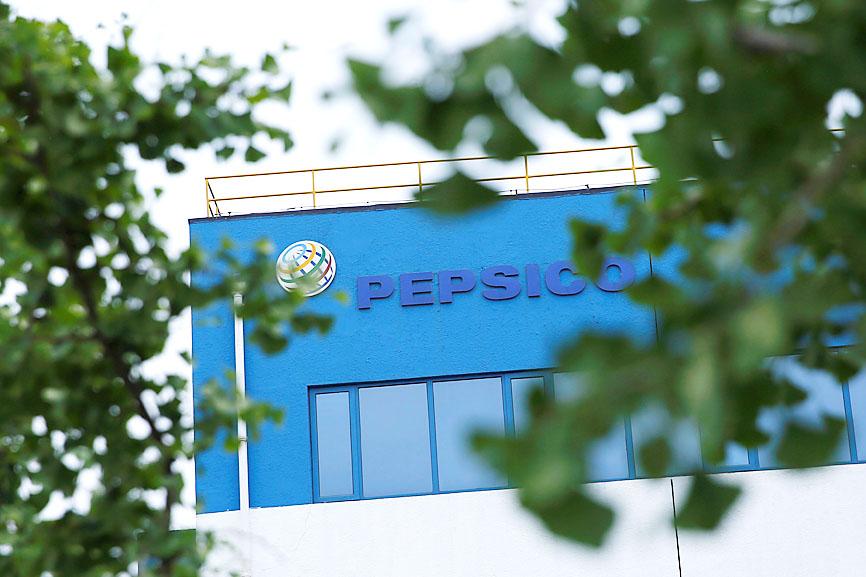China has suspended poultry imports from a Tyson Foods Inc plant where hundreds of employees tested positive for COVID-19, stoking concerns over the broader implications for US and global meat exports.
All products from the plant in Springdale, Arkansas, where Tyson is based, that are about to arrive in China or have arrived at the country’s ports are to be seized by customs.
The suspension announced on Sunday is an about-face from just a few days ago, when Chinese officials said that food was unlikely to be responsible for a fresh virus outbreak in Beijing.

Photo: Reuters
The move is a potential new threat to meat plants across the world that have seen slaughter disruptions because of the virus. In the US, hundreds of workers have become ill, and dozens have died. There has also been an uptick in infections at facilities in Brazil and Germany.
The latest outbreak in China had been blamed on imported salmon after the head of a food market where clusters were detected said that the virus had been traced to a chopping board used by a fish seller.
Fears over whether food can transmit viruses had led salmon to be boycotted in the Asian country.
If China continues to suspend shipments based on COVID-19 cases reported at processing plants, it could threaten to undermine promised agricultural purchases as part of the Washington-Beijing trade deal.
Tyson in a statement on Sunday said that it was looking into the report, citing that the WHO and the US Centers for Disease Control and Prevention (CDC) say there is no evidence that virus transmission is associated with food.
The company late on Friday said that 13 percent of its workers had tested positive for the virus at plants in northwest Arkansas.
China has backed off from its previous stance linking food to virus cases.
A customs official at a briefing on Friday said that the country was taking the advice of international organizations that there is a low risk of imported food transmitting the virus, and no food restrictions would be imposed.
However, the move to block the Tyson shipments runs counter to that, and reverts the country back to increasing its scrutiny over imported food.
Meanwhile, a German abattoir last week voluntarily halted pork exports to China after workers were found to be infected.
China’s customs authorities had started testing all shipments of imported meat for the virus, while officials in some major cities were also checking the products at domestic markets.
In a statement last week, China Customs said that all 32,174 samples of imported seafood, meat, vegetables, fruit and other related products had tested negative.
The country’s scrutiny might end up having a big effect on global food shipments. Its surging imports of meat had helped to buoy US and Brazilian producers of poultry, pork and beef before the nation’s virus outbreak in January and as global trade has staged a nascent recovery in the past few weeks with the country exiting lockdowns.
Meanwhile, PepsiCo Food (China) Co Ltd (百事食品中國) said that it shut a food plant in Beijing after a COVID-19 case was confirmed earlier in the week.
The company conducted tests on all employees at the plant and quarantined 480 workers, even though they all tested negative, one of its officials, Fan Zhimin, told a local government briefing.
PepsiCo China later said in a WeChat post that none of its beverage plants in the country have reported any cases of the virus.

POWERING UP: PSUs for AI servers made up about 50% of Delta’s total server PSU revenue during the first three quarters of last year, the company said Power supply and electronic components maker Delta Electronics Inc (台達電) reported record-high revenue of NT$161.61 billion (US$5.11 billion) for last quarter and said it remains positive about this quarter. Last quarter’s figure was up 7.6 percent from the previous quarter and 41.51 percent higher than a year earlier, and largely in line with Yuanta Securities Investment Consulting Co’s (元大投顧) forecast of NT$160 billion. Delta’s annual revenue last year rose 31.76 percent year-on-year to NT$554.89 billion, also a record high for the company. Its strong performance reflected continued demand for high-performance power solutions and advanced liquid-cooling products used in artificial intelligence (AI) data centers,

SIZE MATTERS: TSMC started phasing out 8-inch wafer production last year, while Samsung is more aggressively retiring 8-inch capacity, TrendForce said Chipmakers are expected to raise prices of 8-inch wafers by up to 20 percent this year on concern over supply constraints as major contract chipmakers Taiwan Semiconductor Manufacturing Co (TSMC, 台積電) and Samsung Electronics Co gradually retire less advanced wafer capacity, TrendForce Corp (集邦科技) said yesterday. It is the first significant across-the-board price hike since a global semiconductor correction in 2023, the Taipei-based market researcher said in a report. Global 8-inch wafer capacity slid 0.3 percent year-on-year last year, although 8-inch wafer prices still hovered at relatively stable levels throughout the year, TrendForce said. The downward trend is expected to continue this year,

A proposed billionaires’ tax in California has ignited a political uproar in Silicon Valley, with tech titans threatening to leave the state while California Governor Gavin Newsom of the Democratic Party maneuvers to defeat a levy that he fears would lead to an exodus of wealth. A technology mecca, California has more billionaires than any other US state — a few hundred, by some estimates. About half its personal income tax revenue, a financial backbone in the nearly US$350 billion budget, comes from the top 1 percent of earners. A large healthcare union is attempting to place a proposal before

‘BASICALLY A BAN’: Sources said the wording governing H200 imports from officials was severe, but added that the regulations might change if the situation evolves Chinese customs authorities told customs agents this week that Nvidia Corp’s H200 artificial intelligence (AI) chips are not permitted to enter China, three people briefed on the matter said. Chinese government officials also summoned domestic technology companies to meetings on Tuesday, at which they were explicitly instructed not to purchase the chips unless necessary, two of the people and a third source said. “The wording from the officials is so severe that it is basically a ban for now, though this might change in the future should things evolve,” one of the people said. The H200, Nvidia’s second-most powerful AI chip, is one